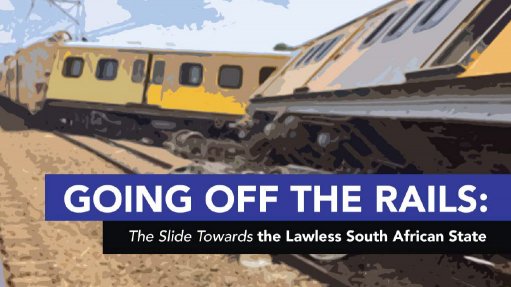
The founding ideals of post-apartheid South Africa are under serious threat as the state slides into lawlessness.
This is the key finding of a report published by the Institute of Race Relations (IRR) in Johannesburg this week. Unlike the South Africa of the apartheid era, which was characterised by the doctrine of parliamentary supremacy, the post-apartheid state was supposed to be a Rechtsstaat "in which the rule of law would be supreme, power would be limited, and the courts would have the final say". However, "this edifice, and these ideals are under threat", according to the report.
Entitled Going off the Rails: The Slide Towards the Lawless South African State and written by John Kane-Berman, a policy fellow at the IRR, the report lists more than 200 incidents of lawless behaviour on the part of the state and its officials, but says that these are but the tip of a large iceberg. Under the rule of President Jacob Zuma, it says, the state has become increasingly lawless. However, lawlessness on the part of the state predates Mr Zuma's election to the Presidency in 2009. An early example was the sabotage by the African National Congress of the parliamentary investigation into the R47 billion arms deal which first came to light nearly 17 years ago. This undermined one of the founding principles of the new South Africa, which was accountability of the executive to Parliament.
The culprits responsible for lawlessness, Kane-Berman says, "run from the president down to clerks of the court, from directors general to immigration officials, from municipal managers to policemen, from cabinet ministers to petty bureaucrats. Lawlessness ranges from protecting the criminal, to hounding the innocent, to crushing the poor. It runs from the unconstitutional to the outright criminal, from the brazen and defiant, to the negligent or ignorant. It embraces slamming down the telephone on judges as well as victimising traffic policemen who flag down celebrities."
The victims of lawless state behaviour "include prisoners denied medical treatment, refugees forced to pay bribes, hawkers whose goods are unlawfully confiscated, and poor people unlawfully evicted from shacks which are then unlawfully demolished". However, Kane-Berman says, they also include taxpayers who get fleeced, mining companies whose licence applications are unlawfully denied, and suppliers who do not get paid for their services. "Moreover, sometimes instead of bowing to the courts and the law, the government seeks - unlawfully - to change the law".
Commenting on the report, Kane-Berman said that lawlessness on the part of the state itself was as serious a problem in South Africa as the country's high crime rate. "It is difficult to see how crime can be successfully combated when the state itself has become more and more lawless and even criminal."
Report by the Institute of Race Relations